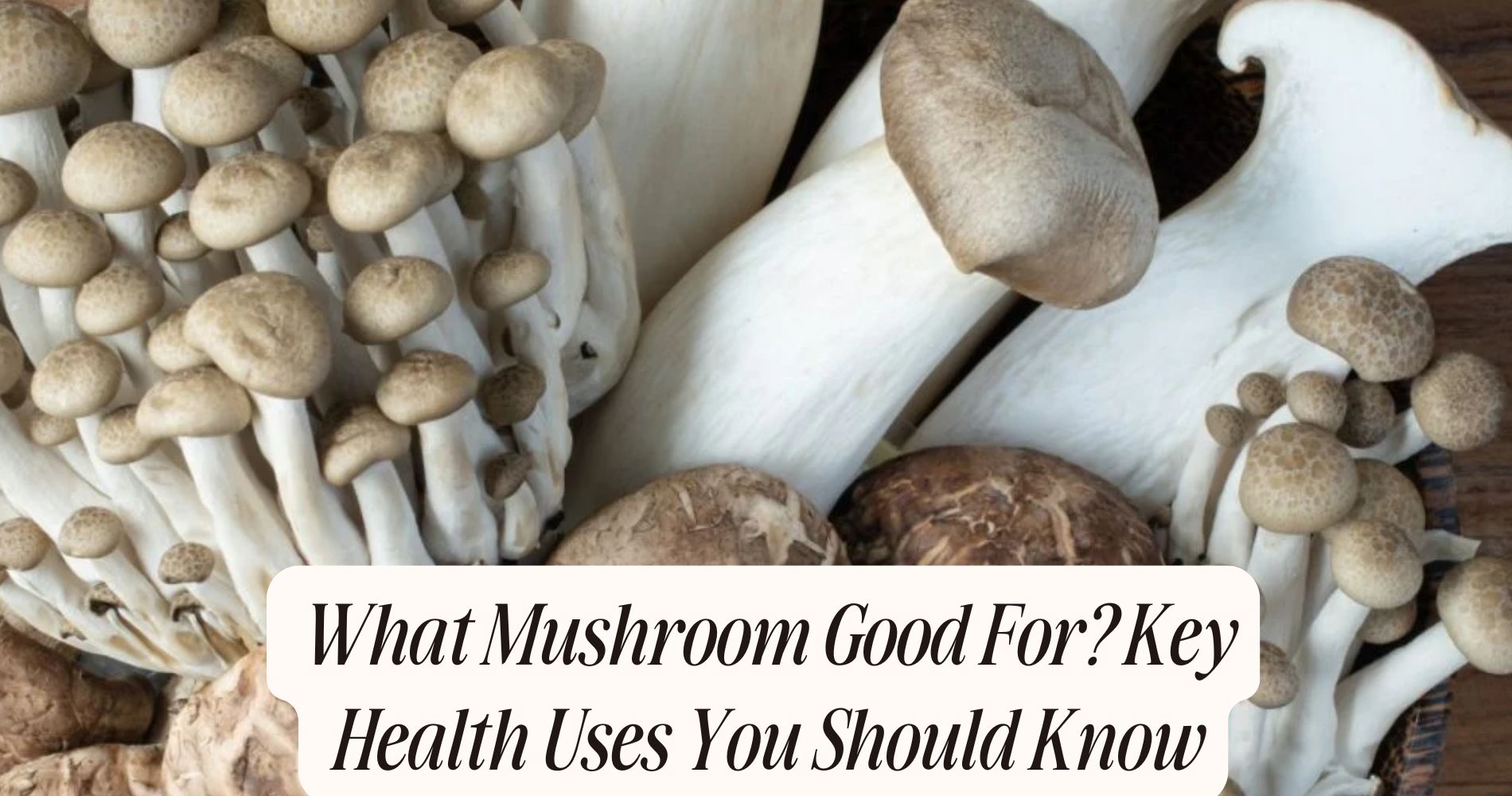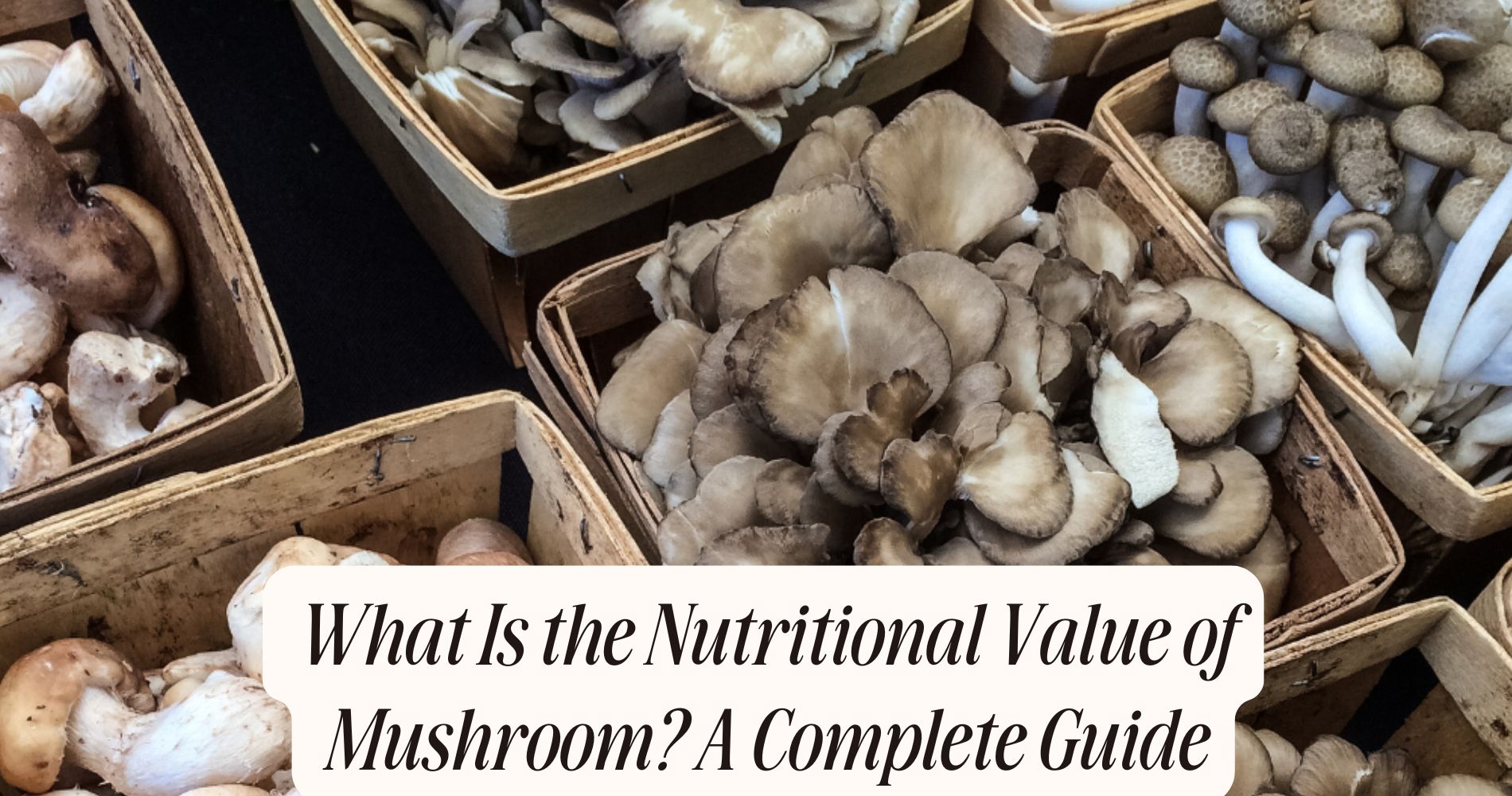
What Mushroom Good For? Key Health Uses You Should Know
What mushroom good for? Mushrooms are packed with health benefits you shouldn’t overlook. They boost your immune system and enhance brain function, thanks to compounds that stimulate nerve growth. Their antioxidant properties help combat oxidative stress, promoting overall wellness. Plus, mushrooms support heart health by improving cholesterol levels and aiding weight management with their low-calorie, high-fiber content. With added skin health benefits, incorporating mushrooms into your diet can truly elevate your well-being. There's much more to discover about these amazing fungi.
Immune System Support
Mushrooms have long been celebrated for their potential to enhance immune system support. Various mushroom varieties, such as reishi, shiitake, and maitake, contain compounds that act as immune boosters.

These mushrooms are rich in beta-glucans, which can stimulate your immune response and help your body fend off illnesses. Research shows that incorporating these mushrooms into your diet may enhance the production of immune cells, promoting overall health.
Additionally, they contain essential vitamins and minerals that further support immune function. Whether you enjoy them in soups, stir-fries, or as supplements, adding these nutrient-dense fungi to your routine can provide a tasty way to strengthen your defenses and maintain your well-being.
Antioxidant Properties
While you may not think of mushrooms as a powerhouse of antioxidants, their potential benefits in this area are significant.
Various mushroom varieties, like shiitake and maitake, are rich in antioxidant compounds, which help combat oxidative stress in your body. These compounds, including ergothioneine and selenium, play an essential role in neutralizing free radicals, potentially reducing the risk of chronic diseases.
Studies suggest that incorporating mushrooms into your diet can enhance your overall antioxidant intake, contributing to better health.
Enhanced Brain Function
As you explore ways to enhance brain function, consider the surprising benefits of incorporating mushrooms into your diet. Certain varieties, like lion’s mane and reishi, are known for their cognitive enhancement properties.

They contain compounds that may stimulate nerve growth factor (NGF) production, which is essential for neuron health and brain connectivity. This can lead to improved memory support, helping you retain information more effectively.
Research suggests that regular consumption of these mushrooms can also boost focus and mental clarity, making it easier to tackle daily tasks.
By adding mushrooms to your meals, you're not just enjoying a tasty ingredient; you’re also nurturing your brain health and sharpening your cognitive abilities.
Give it a try and see how it impacts your mental performance!
Heart Health Benefits
Incorporating mushrooms into your diet can provide significant heart health benefits that you mightn't expect.
These fungi are packed with nutrients that promote cholesterol reduction, helping to lower levels of LDL (bad cholesterol) while raising HDL (good cholesterol). Studies suggest that the fiber and antioxidants found in mushrooms play an essential role in this process, contributing to a healthier lipid profile.
Additionally, mushrooms can enhance circulation improvement by promoting better blood flow and reducing arterial stiffness. This can lower your risk of heart disease and improve overall cardiovascular health.
Anti-Inflammatory Effects
Mushrooms are more than just a delicious addition to your meals; they also offer impressive anti-inflammatory effects. Research shows that various mushroom compounds, such as polysaccharides and triterpenoids, play a vital role in inflammation reduction.
These compounds can help modulate your immune response, potentially lowering chronic inflammation levels in your body. Regular consumption of mushrooms like shiitake, reishi, and maitake can further enhance these benefits.
By incorporating mushrooms into your diet, you’re not only savoring their unique flavors but also supporting your overall health. So, whether you’re adding them to soups, stir-fries, or salads, you’re making a smart choice for inflammation management.
Embrace mushrooms as a flavorful way to help reduce inflammation naturally.
Weight Management Aid
While many people struggle with weight management, adding mushrooms to your diet can be a surprisingly effective strategy. Various mushroom varieties, like shiitake and portobello, are low in calories yet rich in fiber, helping you feel full longer.

This satiety can reduce overall calorie intake, aiding your weight loss efforts. In addition, mushrooms are nutrient-dense, providing essential vitamins and minerals without the added fat of traditional protein sources.
By integrating mushrooms into your meals—whether in salads, stir-fries, or soups—you can enhance flavor and nutrition. Studies show that incorporating these fungi into your dietary routine can support a healthy weight.
Blood Sugar Regulation
Mushrooms can play a significant role in regulating blood sugar levels.
They’ve been shown to improve insulin sensitivity, making it easier for your body to manage glucose.
Plus, with their low glycemic index, they can help you maintain stable energy levels throughout the day.
Insulin Sensitivity Improvement
When it comes to managing blood sugar levels, improving insulin sensitivity is essential for overall health. Certain mushroom varieties, like shiitake and maitake, are notable dietary sources that may enhance insulin sensitivity.
Research suggests that these mushrooms contain bioactive compounds, such as polysaccharides and antioxidants, which help modulate blood sugar levels. By incorporating these mushrooms into your meals, you can potentially support your body’s response to insulin and improve glucose metabolism.
For example, adding sautéed shiitake to a stir-fry or using maitake in soups not only boosts flavor but also provides health benefits. By making these simple changes, you can take proactive steps toward better blood sugar regulation and overall well-being.
Glycemic Control Benefits
Incorporating mushrooms into your diet can considerably aid in glycemic control, helping you manage blood sugar levels more effectively. Certain mushroom varieties, like shiitake and maitake, contain bioactive compounds that can enhance insulin sensitivity and contribute to better blood sugar regulation.
By integrating these mushrooms into your meals, you can create a balanced diet that supports metabolic health. Including a variety of mushrooms not only diversifies your nutrient intake but also provides essential fiber, which can slow glucose absorption.
Simple dietary integration, such as adding mushrooms to soups, stir-fries, or salads, can make a significant difference. Overall, mushrooms offer a tasty and practical way to support glycemic control and promote overall wellness.
Low Glycemic Index
While many foods can impact blood sugar levels, low glycemic index (GI) options like certain mushrooms play an essential role in maintaining stable glucose levels.
Mushroom varieties such as shiitake, portabella, and oyster have a low GI, meaning they don't cause rapid spikes in blood sugar. Incorporating these mushrooms into your meals can help you manage your blood sugar effectively.
You can sauté them, grill them, or add them to soups and salads for a nutritious boost. Their unique flavors enhance your dishes while keeping your blood sugar in check.
Skin Health Improvement
Mushrooms pack a powerful punch when it comes to skin health, thanks to their rich antioxidant properties that help combat oxidative stress.
They also provide essential hydration and nourishment, promoting a radiant complexion.
Antioxidant Properties of Mushrooms
When you consider the benefits of mushrooms, their antioxidant properties stand out, especially for skin health.
Different mushroom varieties, like shiitake and maitake, are rich in compounds such as ergothioneine and selenium, which help combat oxidative stress. By incorporating these mushrooms into your diet through various cooking methods—like sautéing or roasting—you can enhance your skin’s resilience against damage from free radicals.

This can lead to a brighter complexion and reduced signs of aging. Regular consumption of antioxidant-rich mushrooms can also support skin healing processes, making them a smart choice for overall skin health.
Hydration and Nourishment Benefits
In addition to their antioxidant benefits, mushrooms also play a significant role in skin hydration and nourishment. Packed with high nutrient density, mushrooms provide essential vitamins and minerals that support skin health.
They’re natural hydration sources, helping to retain moisture and improve skin elasticity. For instance, varieties like shiitake and maitake contain compounds that promote collagen production, which is vital for youthful skin.
Additionally, the polysaccharides in mushrooms enhance hydration levels, making your skin appear plumper and more radiant. Incorporating these fungi into your diet can lead to improved skin texture and overall health.
Supercharge Your Wellness with SUPER MUSHROOM GUMMIES
Looking for an easy way to tap into the benefits of mushrooms? Well Gummies' SUPER MUSHROOM GUMMIES are the perfect solution! These chewable, vegan gummies feature 10 powerful functional mushrooms, naturally fueling your brain, improving focus, and boosting immune support. With a fresh wild berry taste, they’re as delicious as your favorite candy—without the jitters or crash. Energize your body and sharpen your mind all day long with SUPER MUSHROOM GUMMIES!
Frequently Asked Questions
Can Mushrooms Help With Digestive Health?
Yes, certain mushroom varieties contain digestive enzymes that can enhance gut health. Incorporating these mushrooms into your diet may support digestion, helping your body break down food more efficiently and improving overall digestive function.
Are There Any Risks Associated With Consuming Mushrooms?
Yes, there are risks associated with consuming mushrooms. You could face mushroom toxicity if you eat wild varieties or experience allergic reactions, which can cause symptoms like nausea or skin rashes. Always choose mushrooms carefully.
How Should Mushrooms Be Prepared for Maximum Benefits?
To maximize mushrooms' benefits, use sautéing techniques with healthy fats to enhance nutrient absorption, or try drying methods to concentrate flavors. Both methods maintain their health properties while delivering delicious, versatile dishes that you’ll enjoy.
Do All Mushrooms Offer the Same Health Benefits?
Not all mushrooms offer the same health benefits. Different mushroom varieties have unique nutritional content, which affects their health properties. Exploring these differences can help you choose the right mushrooms for your specific wellness goals.
Can Mushrooms Interact With Medications?
Yes, mushrooms can interact with medications, potentially affecting their efficacy or causing side effects. It's vital to consult your healthcare provider about mushroom interactions to guarantee your medication effects remain safe and effective for your health.
Conclusion
Incorporating mushrooms into your diet can offer a range of health benefits, from boosting your immune system to supporting heart health and enhancing brain function. Their antioxidant and anti-inflammatory properties can help protect your body from various ailments, while also aiding in weight management and blood sugar regulation. By adding these nutritious fungi to your meals, you’re not just enjoying delicious flavors; you’re also investing in your overall well-being. So, why not give them a try?




